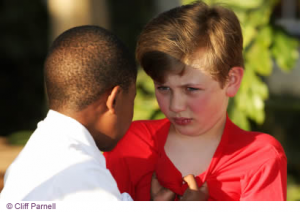
Image credit: iStockphoto
Children who are bullied at school over several years are up to four times more likely to develop psychotic-like symptoms by the time they reach early adolescence.
Researchers at the University of Warwick found children who suffered physical or emotional bullying were twice as likely to develop psychotic symptoms by early adolescence, compared to children who are not bullied. However, if they experienced sustained bullying over a number of years that risk increases up to four times. [continue reading…]
Link Between Seizures and Trauma, Mood Disorders Getting More Attention
When 46-year-old Jane Smith underwent marriage therapy with her husband, the sessions unlocked parts of Jane’s memory that she said she repressed for over a decade — memories with frightening powers.
“I began remembering witnessing my brother being abused… And I began to remember my own abuse,” said Jane, who requested her real name not be used. She said she later realized that she was physically and sexually abused by family members starting at age 4.
Jane confronted her parents, saying she wanted to talk about it, but they did not want to.
“Two weeks later I got a letter from them saying, ‘Don’t contact us again,'” Jane said.
That was when her seizures began. link to continue reading
Source: abc News
Antidepressants can help mild to moderate depression and should not just be used in bad cases, researchers say.
Research published by the National Institute for Health Research Health Technology Assessment (NIHR HTA) programme has found that treatment with a selective serotonin reuptake inhibitor (SSRI) antidepressant alongside supportive care is more effective and cost-effective than supportive care alone for patients with mild to moderate depression. [continue reading…]
Sportsmen and women could get the edge on their opponents by accepting more emotional support in their personal and professional lives.
A study by the University of Exeter, published in the Journal of Applied Sport Psychology, shows the extent to which a sympathetic ear or regular words of encouragement can improve sports performance. [continue reading…]

